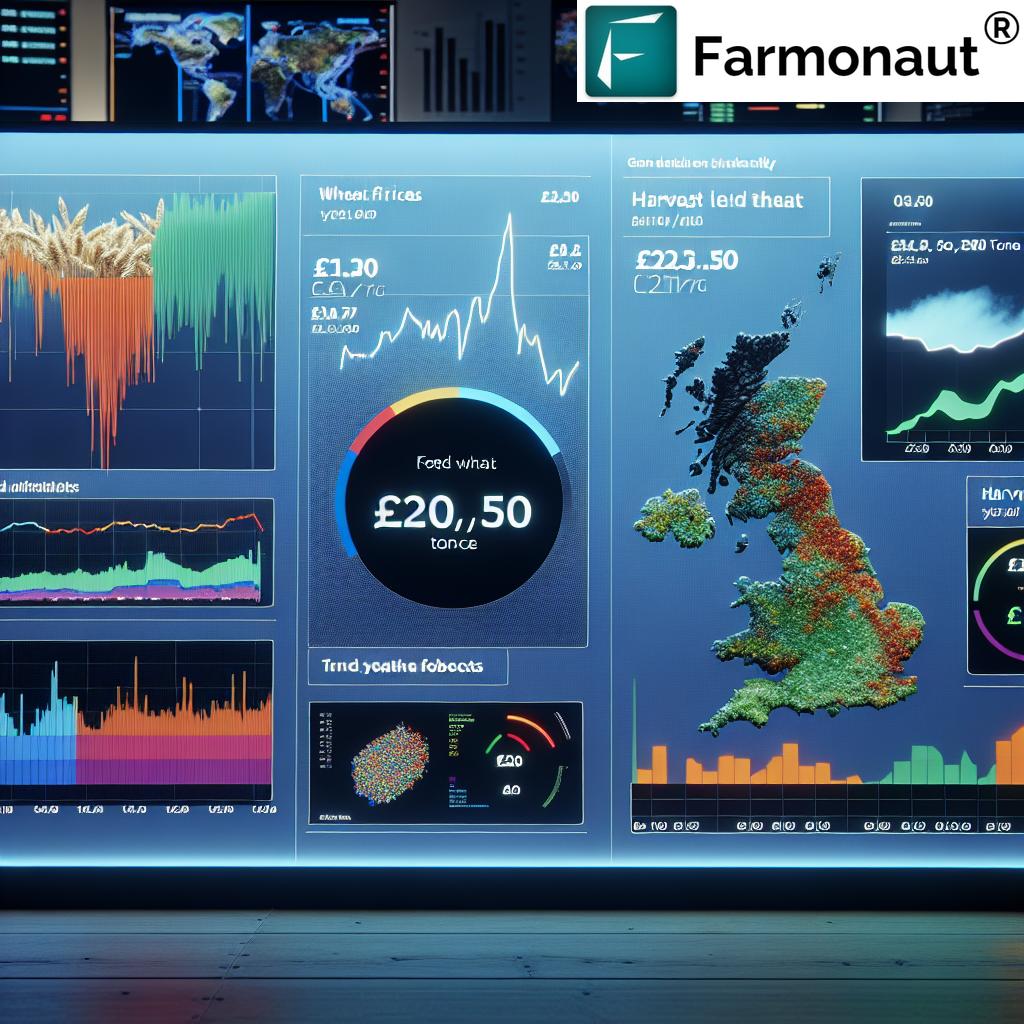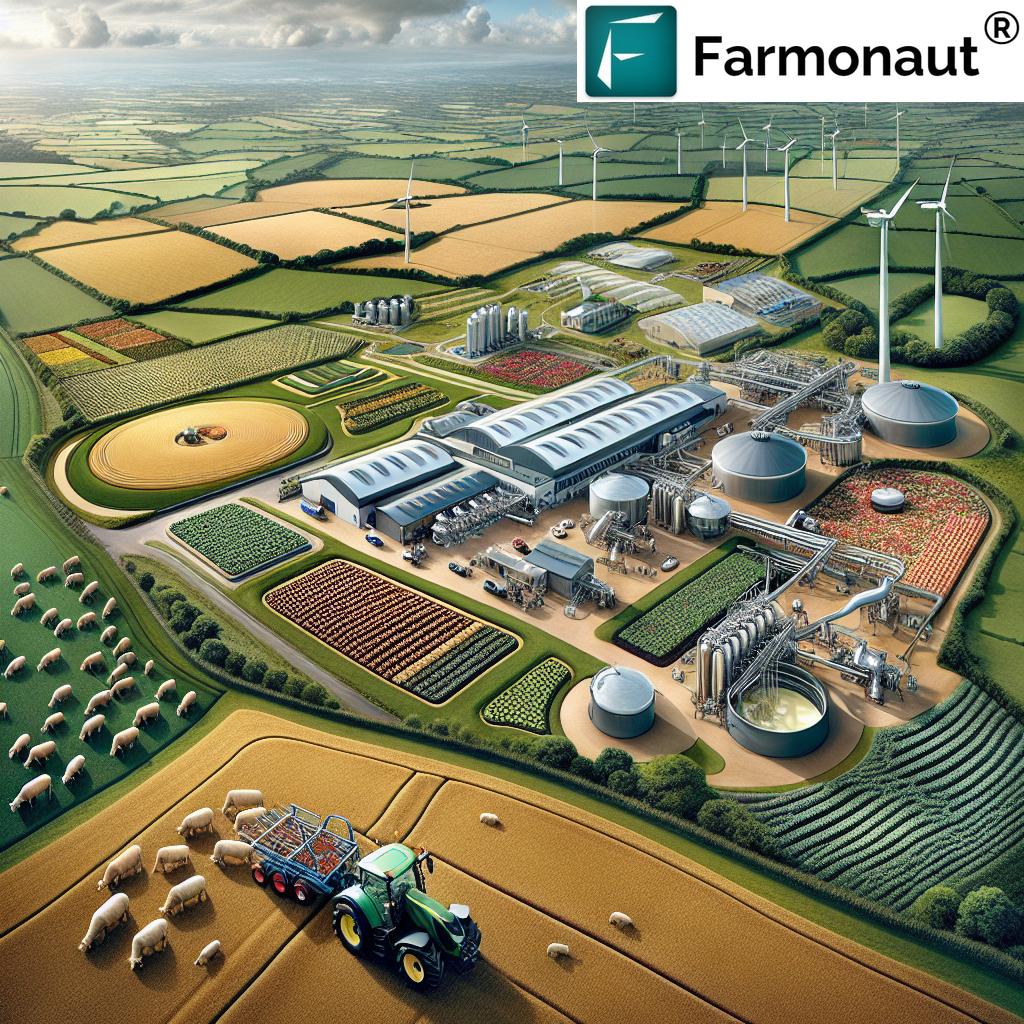Revolutionizing Agronomy: How Strategic Arable Advice is Transforming Yorkshire and Lincolnshire Farms

“Strategic arable advice services cover over 10 different farming sectors, from combinable crops to potatoes.”
In the ever-evolving landscape of modern agriculture, we’re witnessing a remarkable transformation in the way farmers approach their craft, particularly in the fertile regions of Yorkshire and Lincolnshire. The advent of strategic arable advice is revolutionizing agronomy, empowering farmers with cutting-edge tools and insights that are reshaping the future of farming. As we delve into this exciting topic, we’ll explore how these innovative services are addressing the challenges faced by today’s farmers and paving the way for a more sustainable and profitable agricultural sector.
The Emergence of Strategic Arable Advice
Strategic arable advice represents a paradigm shift in agricultural consultancy. It’s a comprehensive approach that combines traditional farming wisdom with modern technology and data-driven insights. This new wave of agricultural guidance is helping farmers in Yorkshire and Lincolnshire navigate the complexities of modern farming, from managing rising input costs to adapting to volatile markets and ever-changing agricultural policies.
- Tailored crop management strategies
- Integration of precision farming technology
- Focus on sustainable agriculture practices
- Data-driven decision-making tools
As we explore this topic, it’s crucial to understand that strategic arable advice is not just about providing information; it’s about empowering farmers to make informed decisions that can significantly impact their yields, profitability, and long-term sustainability.
The Role of Independent Agronomy Services
At the heart of this agricultural revolution are independent agronomy services. These impartial advisors play a pivotal role in helping farmers make crucial decisions without the influence of commercial interests. By offering unbiased guidance, these services ensure that farmers receive advice that’s truly in their best interest.
“Independent agronomy services help farmers navigate 3 key challenges: rising input costs, volatile markets, and changing agricultural policies.”
Independent agronomists bring a wealth of knowledge and experience to the table, offering insights on:
- Optimal crop selection based on soil conditions and market trends
- Efficient use of fertilizers and pesticides
- Implementation of sustainable farming practices
- Risk management strategies in the face of market volatility
By leveraging these services, farmers in Yorkshire and Lincolnshire are better equipped to make decisions that not only improve their current crop yields but also ensure the long-term health and productivity of their land.
Embracing Precision Farming Technology
One of the key components of strategic arable advice is the integration of precision farming technology. This advanced approach to farm management relies on cutting-edge tools and data analytics to optimize every aspect of crop production.
Precision farming technologies being adopted in Yorkshire and Lincolnshire include:
- GPS-guided machinery for precise planting and harvesting
- Drone technology for crop monitoring and pest detection
- Soil sensors for real-time moisture and nutrient analysis
- Satellite imagery for large-scale crop health assessment
These technologies allow farmers to apply inputs like water, fertilizers, and pesticides with pinpoint accuracy, reducing waste and minimizing environmental impact. The result is not only improved crop yields but also a more sustainable approach to farming that benefits both the farmer and the environment.
The Impact of Strategic Arable Advice on Farm Management
The adoption of strategic arable advice is transforming farm management practices across Yorkshire and Lincolnshire. This new approach is helping farmers to:
- Optimize resource allocation
- Improve crop rotation strategies
- Enhance soil health management
- Implement more effective pest and disease control measures
By embracing these advanced management techniques, farmers are seeing significant improvements in their operations. Let’s take a closer look at how strategic arable advice is impacting different aspects of farm management:
| Aspect | Traditional Approach | Strategic Arable Advice Approach |
|---|---|---|
| Decision-making Tools | Reliance on past experience and intuition | Data-driven insights and predictive analytics |
| Input Cost Management | Uniform application across fields | Precision application based on field variability |
| Market Volatility Response | Reactive adjustments to market changes | Proactive strategies and risk management |
| Technology Integration | Limited use of technology | Full integration of precision farming tools |
| Sustainability Practices | Focus on short-term yields | Long-term soil health and environmental considerations |
| Yield Optimization | Estimated 2-3% annual improvement | Potential for 5-10% yield increase with targeted strategies |
This comparison clearly illustrates the transformative impact of strategic arable advice on modern farming practices in Yorkshire and Lincolnshire.
Sustainable Agriculture Practices
A key focus of strategic arable advice is the promotion of sustainable agriculture practices. This approach not only benefits the environment but also ensures the long-term viability of farming operations. Sustainable practices being implemented include:
- Conservation tillage to reduce soil erosion
- Cover cropping to improve soil health
- Integrated pest management to reduce chemical use
- Precision irrigation to conserve water resources
By adopting these practices, farmers in Yorkshire and Lincolnshire are not only reducing their environmental footprint but also improving the resilience of their farms to climate change and other environmental challenges.

The Role of Agritech in Strategic Arable Advice
Agritech solutions are playing an increasingly important role in the delivery of strategic arable advice. These innovative technologies are providing farmers with unprecedented access to data and insights, enabling more informed decision-making. Some key agritech solutions include:
- Farm management software for comprehensive operational oversight
- AI-powered crop monitoring systems
- Blockchain-based traceability solutions for supply chain transparency
- IoT sensors for real-time field monitoring
One company at the forefront of this agritech revolution is Farmonaut. Their advanced satellite-based farm management solutions are helping farmers across Yorkshire and Lincolnshire to optimize their operations and improve crop yields.
Explore Farmonaut’s innovative solutions:
The Future of Strategic Arable Advice
As we look to the future, it’s clear that strategic arable advice will continue to evolve and play an increasingly important role in modern agriculture. Some trends we can expect to see include:
- Greater integration of AI and machine learning in farm management
- Increased focus on carbon sequestration and climate-smart agriculture
- Development of more sophisticated predictive models for crop yields and market trends
- Enhanced collaboration between farmers, advisors, and technology providers
These developments will further empower farmers in Yorkshire and Lincolnshire to meet the challenges of feeding a growing population while maintaining sustainable and profitable operations.
The Role of Collaborative Learning in Strategic Arable Advice
One of the key strengths of strategic arable advice is its emphasis on collaborative learning. This approach brings together farmers, agronomists, and industry experts to share knowledge and best practices. In Yorkshire and Lincolnshire, this collaborative spirit is fostered through:
- Regular farm meetings and field days
- Online forums and discussion groups
- Farmer-led research initiatives
- Industry conferences and workshops
By participating in these collaborative learning opportunities, farmers can stay up-to-date with the latest developments in agronomy and share their own experiences with peers. This exchange of ideas and information is crucial for the continued evolution and improvement of farming practices in the region.
Navigating Agricultural Policy Changes
One of the most significant challenges facing farmers in Yorkshire and Lincolnshire is the ever-changing landscape of agricultural policy. Strategic arable advice plays a crucial role in helping farmers navigate these changes and adapt their operations accordingly. Key areas of focus include:
- Understanding and complying with new environmental regulations
- Adapting to changes in subsidy structures
- Implementing practices to meet sustainability targets
- Preparing for potential trade policy shifts
By staying informed and adapting proactively, farmers can ensure their operations remain compliant and competitive in the face of policy changes.
The Impact on Different Farming Sectors
Strategic arable advice is not a one-size-fits-all solution. Its application varies across different farming sectors, each with its unique challenges and opportunities. Let’s explore how this approach is impacting various sectors in Yorkshire and Lincolnshire:
- Combinable Crops: Precision application of inputs and improved crop rotation strategies
- Potatoes: Advanced irrigation management and disease prevention techniques
- Oilseed Rape: Integrated pest management and optimal planting timing
- Sugar Beet: Soil health management and harvesting optimization
- Livestock: Improved pasture management and feed crop production
By tailoring strategic advice to the specific needs of each sector, farmers can maximize the benefits and address sector-specific challenges more effectively.
The Role of Data in Strategic Arable Advice
At the core of strategic arable advice is the effective use of data. Modern farming generates vast amounts of information, from soil samples to satellite imagery. The challenge lies in turning this data into actionable insights. Here’s how strategic arable advice is leveraging data:
- Big data analytics for trend identification and prediction
- Integration of historical and real-time data for decision-making
- Use of machine learning algorithms for crop yield optimization
- Development of farm-specific models for resource allocation
By harnessing the power of data, strategic arable advice is enabling farmers in Yorkshire and Lincolnshire to make more informed decisions and achieve better outcomes.
The Economic Impact of Strategic Arable Advice
The adoption of strategic arable advice is having a significant economic impact on farms across Yorkshire and Lincolnshire. By optimizing operations and improving decision-making, farmers are seeing:
- Increased crop yields
- Reduced input costs
- Improved resource efficiency
- Enhanced market competitiveness
While the initial investment in technology and advisory services may be substantial, the long-term economic benefits are proving to be significant for many farmers in the region.
Overcoming Challenges in Implementing Strategic Arable Advice
While the benefits of strategic arable advice are clear, its implementation is not without challenges. Farmers in Yorkshire and Lincolnshire may face several obstacles when adopting these new approaches:
- Initial costs of technology and advisory services
- Learning curve associated with new technologies and practices
- Resistance to change from traditional farming methods
- Concerns about data privacy and security
Overcoming these challenges often requires a combination of education, support, and gradual implementation. Many farmers find that the long-term benefits far outweigh the initial hurdles.
The Role of Research and Development
Continuous research and development are crucial for the ongoing evolution of strategic arable advice. In Yorkshire and Lincolnshire, several initiatives are driving innovation in this field:
- Collaboration between universities and agricultural research institutions
- On-farm trials of new technologies and farming practices
- Development of region-specific crop varieties and management techniques
- Integration of climate change research into agricultural strategies
These research efforts ensure that strategic arable advice remains at the cutting edge, continually adapting to new challenges and opportunities in the agricultural sector.
The Future of Farming in Yorkshire and Lincolnshire
As we look to the future, it’s clear that strategic arable advice will play a pivotal role in shaping the agricultural landscape of Yorkshire and Lincolnshire. We can expect to see:
- Increased adoption of precision farming techniques
- Greater emphasis on sustainable and regenerative agriculture
- More integrated and data-driven farm management systems
- Enhanced collaboration between farmers, advisors, and technology providers
By embracing these trends and continuing to innovate, farmers in the region are well-positioned to meet the challenges of the future while maintaining profitable and sustainable operations.
Conclusion
The revolution in agronomy brought about by strategic arable advice is transforming farms across Yorkshire and Lincolnshire. By combining traditional farming wisdom with cutting-edge technology and data-driven insights, this approach is empowering farmers to make more informed decisions, optimize their operations, and adapt to changing market conditions and environmental challenges.
As we’ve explored throughout this article, the benefits of strategic arable advice are far-reaching, impacting everything from crop yields and input costs to sustainability and long-term farm viability. While challenges remain, the future of farming in Yorkshire and Lincolnshire looks bright, with strategic arable advice playing a central role in shaping a more efficient, productive, and sustainable agricultural sector.
For farmers looking to stay ahead of the curve and maximize the potential of their operations, embracing strategic arable advice and the technologies that support it is no longer just an option—it’s a necessity. As the agricultural landscape continues to evolve, those who adapt and leverage these innovative approaches will be best positioned to thrive in the years to come.
FAQ Section
Q: What is strategic arable advice?
A: Strategic arable advice is a comprehensive approach to farm management that combines traditional farming knowledge with modern technology and data-driven insights to optimize crop production, resource management, and overall farm performance.
Q: How does strategic arable advice differ from traditional farming methods?
A: Unlike traditional farming methods that rely heavily on past experience and intuition, strategic arable advice utilizes data analytics, precision farming technologies, and expert insights to make more informed and targeted decisions about crop management and resource allocation.
Q: What technologies are commonly used in strategic arable advice?
A: Common technologies include GPS-guided machinery, drone technology for crop monitoring, soil sensors for nutrient analysis, satellite imagery for large-scale crop health assessment, and farm management software for data integration and analysis.
Q: How does strategic arable advice contribute to sustainable farming?
A: Strategic arable advice promotes sustainable farming practices by optimizing resource use, reducing chemical inputs through precision application, improving soil health management, and implementing environmentally friendly pest control methods.
Q: What are the main benefits of adopting strategic arable advice for farmers in Yorkshire and Lincolnshire?
A: The main benefits include increased crop yields, reduced input costs, improved resource efficiency, better adaptation to market volatility and policy changes, and enhanced long-term sustainability of farming operations.
Q: Are there any challenges in implementing strategic arable advice?
A: Yes, challenges can include initial costs of technology and advisory services, a learning curve associated with new technologies and practices, potential resistance to change, and concerns about data privacy and security.
Q: How does strategic arable advice help farmers navigate policy changes?
A: Strategic arable advice helps farmers stay informed about policy changes, understand their implications, and adapt their operations accordingly. This includes guidance on complying with new regulations, adapting to changes in subsidy structures, and implementing practices to meet sustainability targets.
Q: What role does collaborative learning play in strategic arable advice?
A: Collaborative learning is a key component of strategic arable advice, fostering knowledge sharing among farmers, agronomists, and industry experts through farm meetings, online forums, and industry events. This exchange of ideas and experiences helps drive continuous improvement in farming practices.
Q: How is data used in strategic arable advice?
A: Data is central to strategic arable advice, with big data analytics, machine learning algorithms, and integrated data systems being used to identify trends, make predictions, and generate actionable insights for farm management decisions.
Q: What does the future hold for strategic arable advice in Yorkshire and Lincolnshire?
A: The future of strategic arable advice in the region is likely to see increased integration of AI and machine learning, a greater focus on climate-smart agriculture, more sophisticated predictive modeling, and enhanced collaboration between farmers, advisors, and technology providers.
















